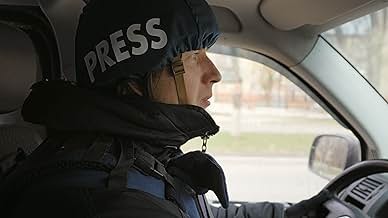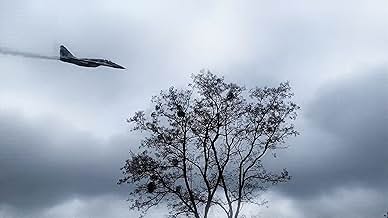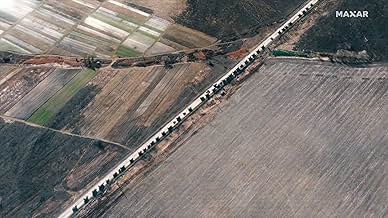Ajouter une intrigue dans votre langueAn AP team of Ukrainian journalists trapped in the besieged city of Mariupol struggle to continue their work documenting atrocities of the Russian invasion.An AP team of Ukrainian journalists trapped in the besieged city of Mariupol struggle to continue their work documenting atrocities of the Russian invasion.An AP team of Ukrainian journalists trapped in the besieged city of Mariupol struggle to continue their work documenting atrocities of the Russian invasion.
- A remporté 1 oscar
- 34 victoires et 51 nominations au total
Liudmyla Amelkina
- Self - Mariupol Resident
- (as Lyudmyla Amelkina)
Roman Golovanov
- Self - Correspondent
- (archive footage)
- …
Igor Konashenkov
- Self
- (archive footage)
Sergey Lavrov
- Self - Minister of Foreign Affairs of Russia
- (archive footage)
Ernest Matskyavichyus
- Self - Journalist
- (archive footage)
Vasiliy Nebenzya
- Self - Russian Ambassador to the UN
- (archive footage)
Volodymyr Nikulin
- Self - Police Officer
- (as Volodymyr)
Sergei Orlov
- Self - Deputy Mayor of Mariupol
- (archive footage)
Vladimir Putin
- Self - President of Russia
- (archive footage)
Linda Thomas-Greenfield
- Self - U.S. Ambassador to the UN
- (archive footage)
Volodymyr Zelenskyy
- Self - President of Ukraine
- (archive footage)
Avis en vedette
I think this documentary needs to be added on YouTube and watched for free, specially in Russia! Everyone have to see how russian army killed civilians, women, children. This documentary is an evidence of the war!
I was crying heavily during all movie. I was always thinking "what happened to the people who were caught on camera? Are they alive? What happened to this little girl which was born? Did this man got to his wife? Did the boy survived? What happened to a policeman? Is he still alive? How about this doctor who was shouting about Putin? Where is he? Is he ok? What about these military men? " I couldn't stop thinking about these people!
I was crying heavily during all movie. I was always thinking "what happened to the people who were caught on camera? Are they alive? What happened to this little girl which was born? Did this man got to his wife? Did the boy survived? What happened to a policeman? Is he still alive? How about this doctor who was shouting about Putin? Where is he? Is he ok? What about these military men? " I couldn't stop thinking about these people!
I saw this in a well-attended cinema screening just the other day. I can't recall a film having the impact this one did. At the end credits - silence. No one said a word and slowly filtered out. Its difficult not being effected by this film, as it confronts the viewer with the sort of hard-hitting stuff that the news generally air-brushes out. Its pretty much the exact opposite of comfort viewing - this film confirms not only are things bad but they are probably a lot worse than you imagined them to be.
As the title indicates, this is a ground level view of events in the Ukrainian city of Mariupol in the first 20 days of the Russian invasion. A disembodied voice-over relates details and an ominous soundtrack magnifies certain moments but mostly, the footage speaks for itself. The basic set-up has journalist Mstyslav Chernov stay behind to film events as the horror of war escalates on a daily basis. From Chernov's position, we are put directly into the war zone and are confronted with the civilian experience. To this end, we are forced to see the terror and suffering that these innocent people are forced to endure on account of a war initiated for utterly disingenuous reasons. While this is clearly a film about the Ukrainian situation and the sheer wrongness of the Russian invasion, it also will get you thinking that it is also about war in general, as these shocking moments are happening all over our world as part of various military conflicts. We can become desensitised to this and our news reporting is often far too sanitised, allowing us to more easily disconnect. Its films like this one which approaches war in the opposite way and ensures the viewer has no easy escape.
As the title indicates, this is a ground level view of events in the Ukrainian city of Mariupol in the first 20 days of the Russian invasion. A disembodied voice-over relates details and an ominous soundtrack magnifies certain moments but mostly, the footage speaks for itself. The basic set-up has journalist Mstyslav Chernov stay behind to film events as the horror of war escalates on a daily basis. From Chernov's position, we are put directly into the war zone and are confronted with the civilian experience. To this end, we are forced to see the terror and suffering that these innocent people are forced to endure on account of a war initiated for utterly disingenuous reasons. While this is clearly a film about the Ukrainian situation and the sheer wrongness of the Russian invasion, it also will get you thinking that it is also about war in general, as these shocking moments are happening all over our world as part of various military conflicts. We can become desensitised to this and our news reporting is often far too sanitised, allowing us to more easily disconnect. Its films like this one which approaches war in the opposite way and ensures the viewer has no easy escape.
Considering the searing nature of this troubling documentary, I feel somewhat uneasy in recommending it as must-see viewing. Nevertheless, this is one of those films that has to be seen in order for the truth behind its story to be fully realized. When Ukrainian journalist-writer-director Mstyslav Chernov and two colleagues chronicled the first days of the nation's brutal conflict with Russia, they probably had no idea what they were in for. Working from the Black Sea port city of Mariupol, they captured devastating footage of the relentless Russian attacks, particularly the enemy's ruthless assaults on civilian targets, despite assurances to the contrary. The Russians were simultaneously determined to destroy the Ukrainian communications infrastructure to prevent word of the atrocities from getting out to the wider world, seriously hindering the work of Chernov and company as the only international journalists still in the war-torn country at the time. As the city was systematically being destroyed, the international community had little knowledge of what was transpiring in Mariupol beyond Russian President Vladimir Putin's skewed propaganda claims. But, when images of the warfront finally made their way out of Ukraine, the world got an entirely new perspective on the carnage unfolding there, despite the Russians' astoundingly incredulous claims that everything that had been photographed was staged, not unlike what one would find on a movie set. Such reporting opened the eyes of the world, first in media coverage at the time and now in this film, a joint production of the Associated Press and the PBS documentary series Frontline. This gripping release holds nothing back, making it an exceedingly difficult watch for virtually everyone, including those with thick skins who ordinarily might not be affected by such graphic imagery. However, it honestly reveals what the Ukrainians were up against in this horrific siege, putting the war crimes of the aggressors on display for all to see. In addition, this offering reinforces the importance of the work of intrepid journalists under the most trying of conditions, particularly where those wreaking havoc are desperate to keep the facts from reaching the light of day. This highly acclaimed film - a recipient of ample awards season buzz and honors - may be difficult to sit through, but discovering the truth is often a challenging process, and both Ukraine and the world should be grateful that there are those out there who are willing to put themselves on the line to see that through, no matter how treacherous or daunting circumstances may be.
If you are a human being alive in 2024 and living in a civilised country, this is mandatory viewing. If your government is blocking aide to Ukraine, get on the phone to your representatives every day, make noise, donate what you can to approved organisations (Red Cross, etc), demonstrate (peacefully), wear the colours of Ukraine, and NEVER let anyone forget what is happening there.
For two years I wear a pin with the Ukraine colours every day, and strangers come to me and shake my hand, or share a "Slava Ukraini"! With me.
What is currently happening with funding from the richest countries in the world drying up for internal political reasons is the biggest sin I have witnessed in my lifetime.
Share this film with everyone you know!
For two years I wear a pin with the Ukraine colours every day, and strangers come to me and shake my hand, or share a "Slava Ukraini"! With me.
What is currently happening with funding from the richest countries in the world drying up for internal political reasons is the biggest sin I have witnessed in my lifetime.
Share this film with everyone you know!
This documentary is about as real as it gets. The film is pieced together from footage shot in Mariupol during February and March 2022. You might have already seen snippets, especially from the maternity hospital, but this takes you day by day and includes some less common materials.
I won't get into the usual critiques of quality or story flow. That would be idiotic. They captured what they could in the midst of war, when everything including electricity for their cameras was at scarce. It surprises me that some reviewers are complaining, as if this were some Hollywood production in the making for five years. Jesus.
I recommend watching it. The war is ongoing, and it won't just disappear because we're tired of it. It serves as a powerful reminder to the world about what's happening in Ukraine every day.
I won't get into the usual critiques of quality or story flow. That would be idiotic. They captured what they could in the midst of war, when everything including electricity for their cameras was at scarce. It surprises me that some reviewers are complaining, as if this were some Hollywood production in the making for five years. Jesus.
I recommend watching it. The war is ongoing, and it won't just disappear because we're tired of it. It serves as a powerful reminder to the world about what's happening in Ukraine every day.
Le saviez-vous
- AnecdotesA photograph by Evgeniy Maloletka of the injured pregnant woman being carried from the maternity hospital, was awarded "World Press Photo of the Year" in 2023. Her name was Irina Kalinina (32 years old). Her baby, named Miron (after the word for 'peace') was stillborn, and then his mother died in half an hour.
- Citations
Self - Narrator and interviewer: When we were in the hospital, one of the doctors told me, "War is like an X-Ray. All human insides become visible. Good people become better, bad people worse".
- ConnexionsFeatured in 2024 EE BAFTA Film Awards (2024)
Meilleurs choix
Connectez-vous pour évaluer et surveiller les recommandations personnalisées
- How long is 20 Days in Mariupol?Propulsé par Alexa
Détails
- Date de sortie
- Pays d’origine
- Sites officiels
- Langues
- Aussi connu sous le nom de
- 20 днів у Маріуполі
- Lieux de tournage
- sociétés de production
- Consultez plus de crédits d'entreprise sur IMDbPro
Box-office
- Brut – à l'échelle mondiale
- 35 971 $ US
- Durée1 heure 37 minutes
- Couleur
- Mixage
Contribuer à cette page
Suggérer une modification ou ajouter du contenu manquant












